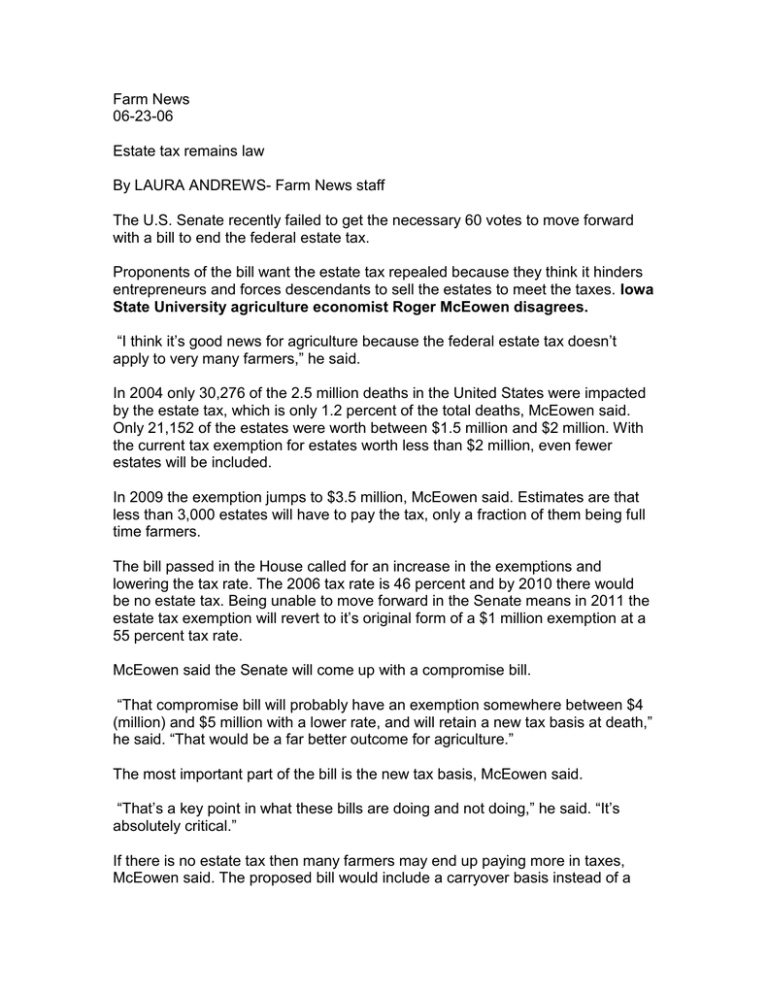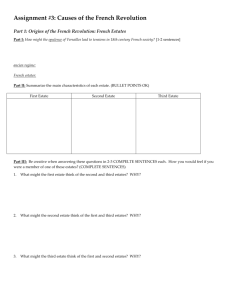Farm News 06-23-06 Estate tax remains law
advertisement

Farm News 06-23-06 Estate tax remains law By LAURA ANDREWS- Farm News staff The U.S. Senate recently failed to get the necessary 60 votes to move forward with a bill to end the federal estate tax. Proponents of the bill want the estate tax repealed because they think it hinders entrepreneurs and forces descendants to sell the estates to meet the taxes. Iowa State University agriculture economist Roger McEowen disagrees. “I think it’s good news for agriculture because the federal estate tax doesn’t apply to very many farmers,” he said. In 2004 only 30,276 of the 2.5 million deaths in the United States were impacted by the estate tax, which is only 1.2 percent of the total deaths, McEowen said. Only 21,152 of the estates were worth between $1.5 million and $2 million. With the current tax exemption for estates worth less than $2 million, even fewer estates will be included. In 2009 the exemption jumps to $3.5 million, McEowen said. Estimates are that less than 3,000 estates will have to pay the tax, only a fraction of them being full time farmers. The bill passed in the House called for an increase in the exemptions and lowering the tax rate. The 2006 tax rate is 46 percent and by 2010 there would be no estate tax. Being unable to move forward in the Senate means in 2011 the estate tax exemption will revert to it’s original form of a $1 million exemption at a 55 percent tax rate. McEowen said the Senate will come up with a compromise bill. “That compromise bill will probably have an exemption somewhere between $4 (million) and $5 million with a lower rate, and will retain a new tax basis at death,” he said. “That would be a far better outcome for agriculture.” The most important part of the bill is the new tax basis, McEowen said. “That’s a key point in what these bills are doing and not doing,” he said. “It’s absolutely critical.” If there is no estate tax then many farmers may end up paying more in taxes, McEowen said. The proposed bill would include a carryover basis instead of a new tax basis. Under the current estate tax, the descendants are exempt from paying capital gains unless they sell it for more than the current market fair value. Without the estate tax, estates passed on to the spouse worth more than $3 million and estates passed on to anyone other than the spouse worth more than $1.3 million would have to pay capital gains taxes if they sold the land. That would result in the descendants paying more, he said. The Americans for a Fair Estate Tax Web site, www.ombwatch.org/estatetax/, gave the example of a heavily mortgaged farm. Under the current law it would be exempt from the estate tax. Without the estate law the descendants would be subject to the capital gains tax because of the carryover basis. Widows would also be subject to capital gains taxes without the estate tax, according to the Web site. Under the estate tax they aren’t subject to it. “What we need is a compromise piece that increases exemption, has an index for inflation, and retains a complete new tax basis at death so the future is more certain,” McEowen said. According to the Tax Center Policy Web site (www.taxpolicycenter.org) repeal of the estate tax would cost the government $1 trillion over the next 10 years. The lost revenue would be made up by raising taxes in other areas, McEowen said.







